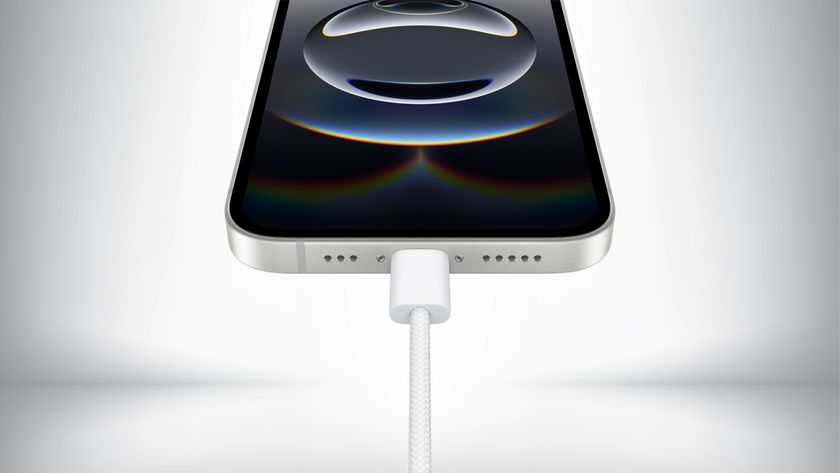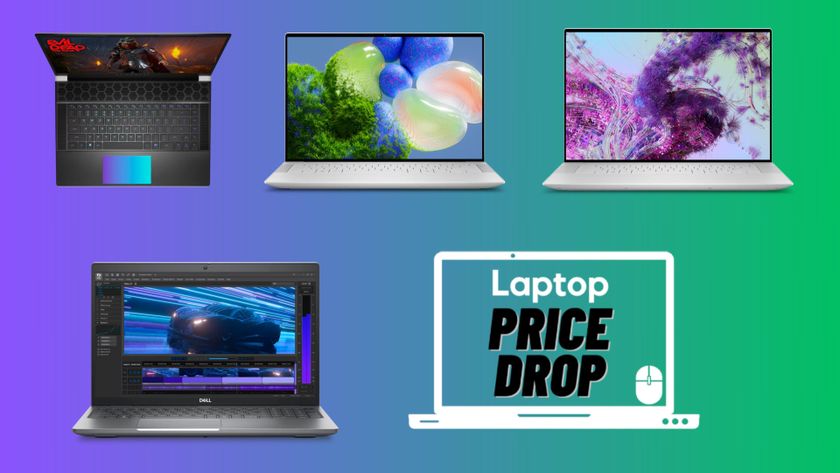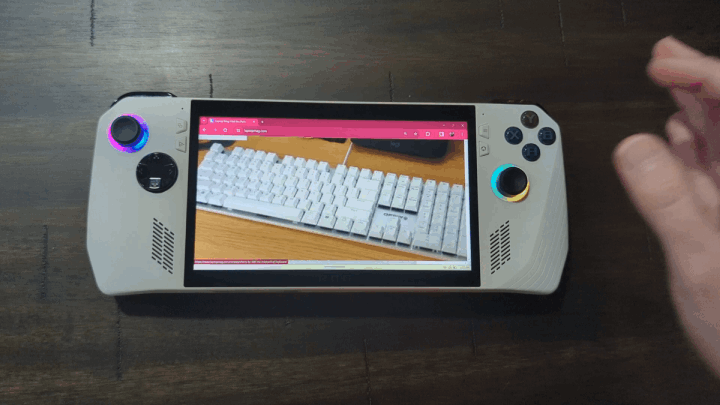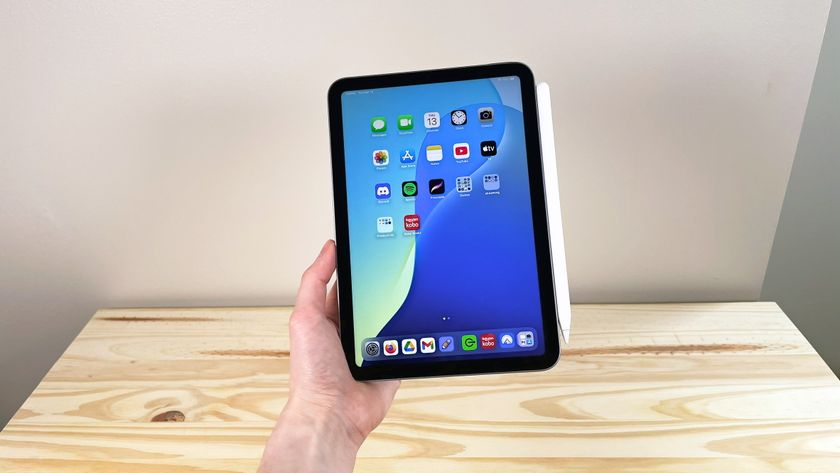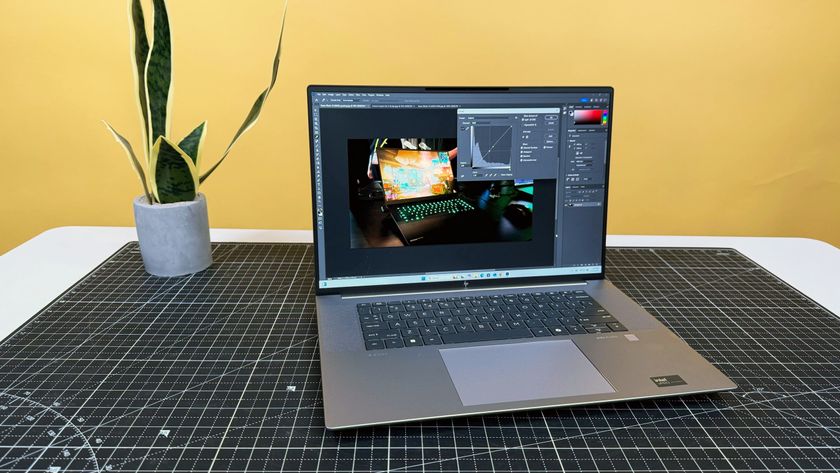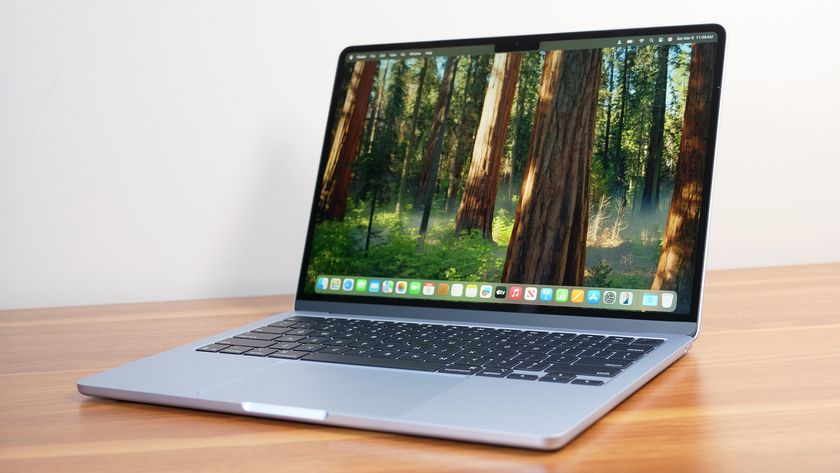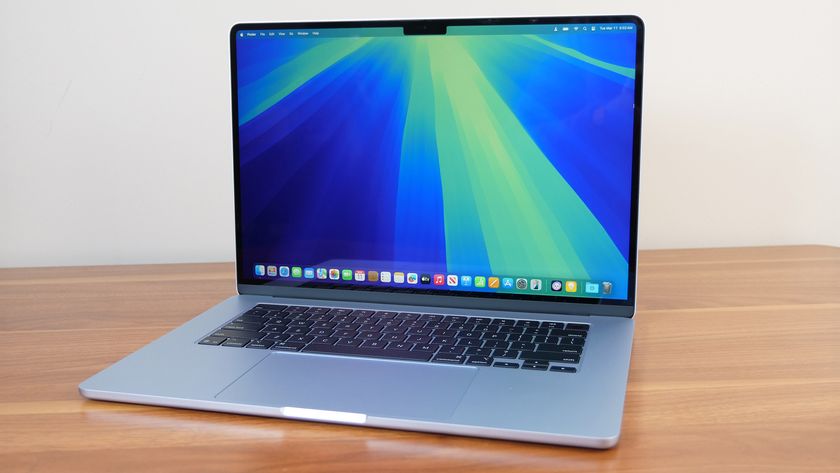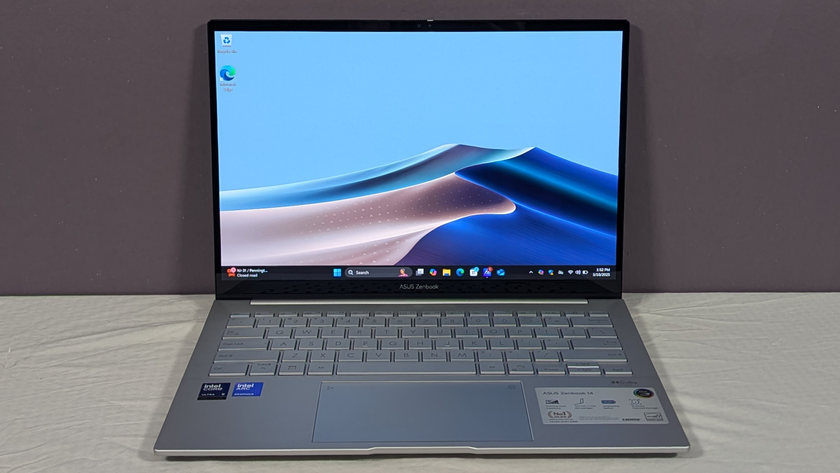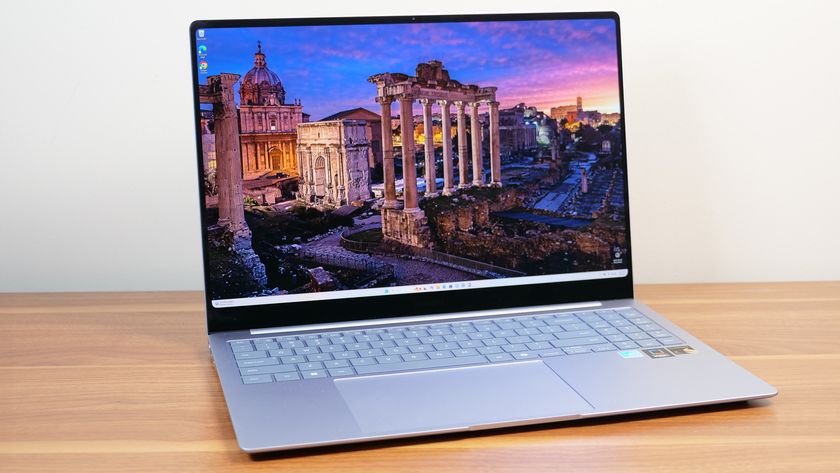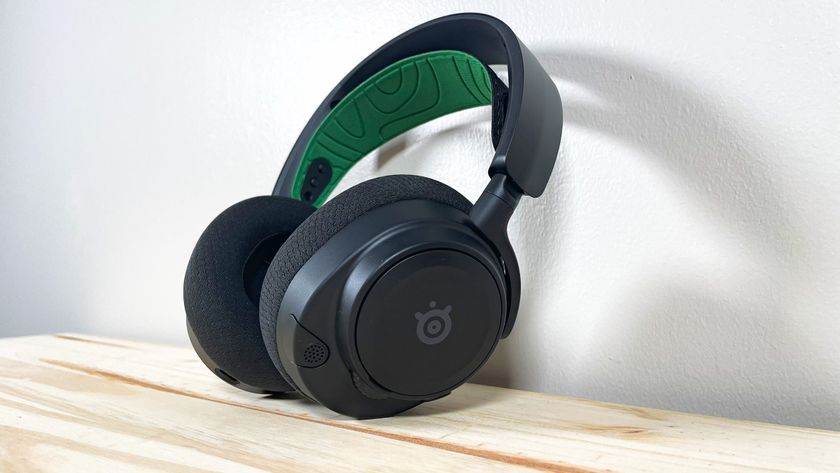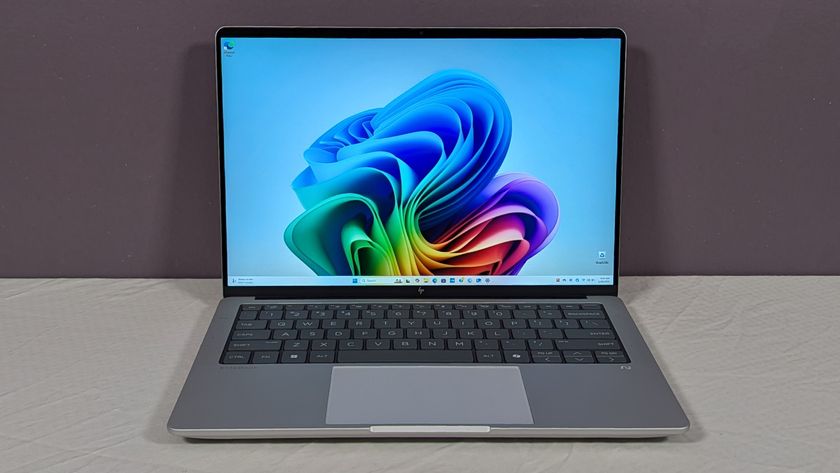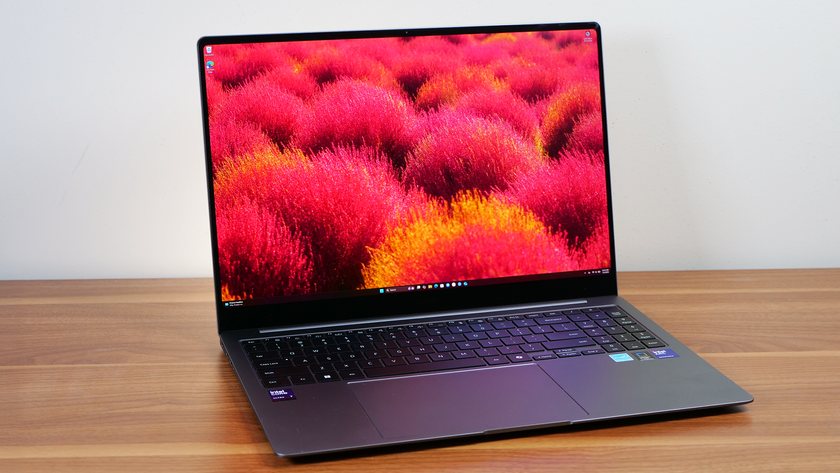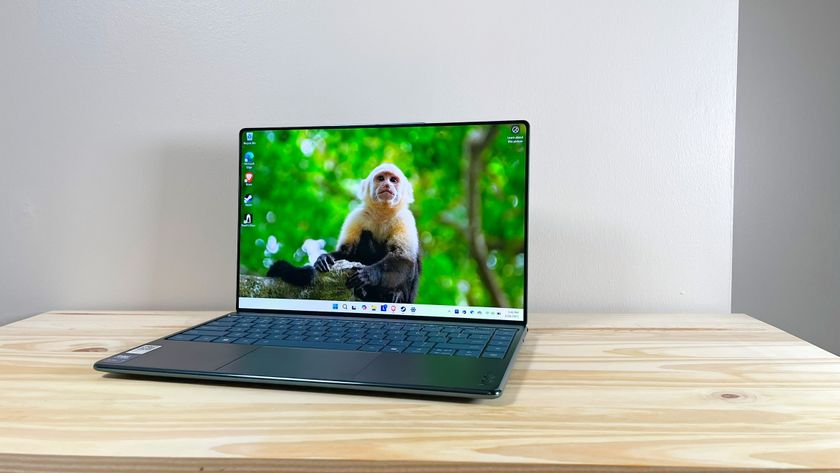Laptop Mag Verdict
The $999 Acer Iconia W700-6465 is gorgeous and fast, but this 11-inch tablet costs a pretty penny.
Pros
- +
Attractive aluminum design
- +
Lush and crisp display
- +
Ships with keyboard and dock
- +
Intuitive and helpful Acer Ring utility
- +
Above-average overall performance
- +
Good battery life
Cons
- -
Expensive
- -
Thick and heavy for a tablet
- -
Dock too unwieldy for travel
- -
Poor camera quality
Why you can trust Laptop Mag
With Windows 8, the line between tablets and laptops is becoming increasingly blurred. The Acer Iconia W700, a beautiful 11-inch slate from Acer, crams the components you'd expect out of Ultrabook into an all-aluminum slate. We're talking a 1.7-GHz Core i5 processor, 4GB of RAM and a 128GB SSD. For a fairly steep $999, $100 more than the upcoming Microsoft Surface with Windows 8 Pro, you also get a gorgeous full HD display, as well as a Bluetooth keyboard and dock. Is this tablet powerful and versatile enough to be your only PC?
Design
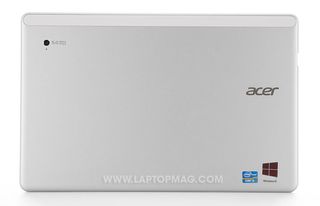
Click to EnlargeAs one would expect from the price tag, the Iconia W700 sports a luxurious design. From the front, half-an-inch-thick bezel frames the glossy 11.6-inch HD display, with a 1.3-megapixel front-facing camera centered above the display and a silver Windows button below it. The back plate, constructed of durable aluminum, wraps around the sides of the tablet and extends a third of an inch onto the front at the bottom.
A rear-facing 5-megapixel camera, embossed Acer logo and thin strip of white plastic running the length of the tablet near the top provide the sole flourishes on the solid aluminum back plate. The chassis itself resists fingerprints nicely and felt cool beneath our fingertips.
Still, at 11.61 x 7.52 x 0.47 inches and 2.0 pounds (3.6 pounds when connected to its dock) the Iconia W700 is heavy and thick for a tablet. Although it has a smaller 9.7-inch display, the iPad weighs a mere 1.44 pounds and measures 0.37 inches thick. The Acer Aspire S7 Ultrabook is actually thinner than this device (0.46 inches thick and 2.8 pounds).
While we appreciate that including a full-size USB port will inevitably increase a tablet's thickness, the $750 Samsung ATIV Smart PC - another Windows 8-powered slate - manages to squeeze three USB ports into a 0.39-inch-thick frame that weighs half a pound less than the W700. To be fair, the W700's most direct competitor, the Surface with Windows 8 Pro, also weighs 2 pounds and measures an even thicker 0.53 inches. But that doesn't mean users will enjoy carrying this Acer.
Another consequence of the W700's weight and size is that it quickly becomes uncomfortable to hold for extended periods of time. Switching to portrait mode helps relieve some of the burden, but we found ourselves using the dock more often than we did holding it.
Display
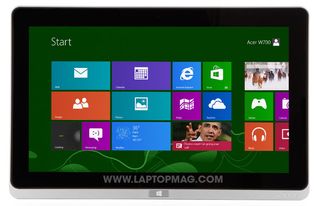
Click to EnlargeAlthough it doesn't boast as high a resolution as the Google Nexus 10 (2560 x 1600) or the 4th generation iPad (2048 x 1536), the Iconia W700's 11.6-inch, 1920 x 1080 LED-backlit Gorilla Glass 2 display nevertheless boasts incredibly sharp and colorful visuals. Watching a 1080p trailer for "The Hobbit," for example, we could make out the creases and folds in Bilbo's careworn face, and his bright red vest popped off the screen. The tablet also enjoys wide viewing angles - we could move 45 degrees in either direction without losing clarity.
The Iconia W700 also proved significantly brighter than the competition. At 369 lux, it outshines both the Aspire S7 (215 lux) and the ultraportable average (234 lux). Only the VAIO Duo 11 (402 lux) offers a more vivid screen. Unfortunately, the brightness of the W700's display doesn't make it easier to view in direct sunlight - when we tried watching the trailer for "The Hobbit" on the roof of our building, fingerprint smudges and the reflections of nearby buildings made it difficult to discern images on the screen.
The problem with having such a sharp resolution in desktop mode is that icons and other items become incredibly difficult to target with a finger. iOS doesn't have that problem on the Retina Display iPad.
Audio
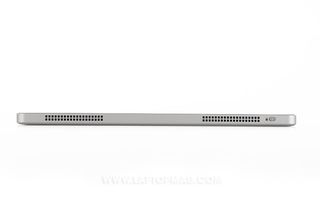
Click to EnlargeThe Iconia W700's bottom-mounted speakers pumped out enough sound to fill a small room, but bass-heavy songs suffered from a fair amount of distortion when played at maximum volume. When listening to the track "Rinzler" on the score to "Tron: Legacy," for example, the sound of the horns grew increasingly harsh as they built to a crescendo. Thankfully, audio quality proved much better on softer tracks such as Kris Kristofferson's "Living Legend." We could easily make out individual instruments such as the mandolin and the synthesizer.
Acer bundles the W700 with Dolby Home Theater v4 audio enhancement software, which lets users choose from one of three audio presets - movie, music and game - or create their own custom preset. Other features include a volume leveler, dialog enhancer and surround sound virtualization.
Keyboard and Dock
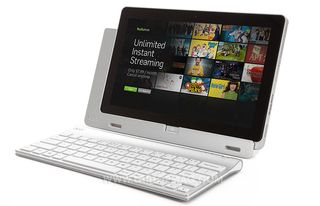
Click to EnlargeTrying to type a document or compose an email using a touch screen can quickly become an exercise in frustration, but thankfully Acer bundles the Iconia W700 with a stylish Bluetooth keyboard and dock. The island-style keyboard, which measures 11.25 x 5.0 x 0.7 inches and weighs 14.2 ounces, features a silver plastic finish designed to mirror the W700's aluminum chassis and is a powered by three AAA batteries.
Syncing the keyboard with the tablet proved easy. We just flipped the switch to "on" and within a few seconds we were typing away. The keyboard itself delivered a pleasant amount of tactile feedback, and although somewhat cramped it allowed us to reach a rate of 59 words per minute on the Ten Thumbs Typing Test. That's just slightly below our average speed.
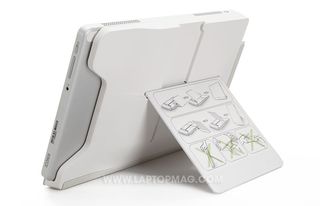
Click to EnlargeThe white-and-silver dock lets you slide the tablet into place from the right, with USB and DC-in connections on the left. Three extra USB 3.0 ports and a DC-in jack are located on the back of the dock. The removable kickstand can be inserted horizontally or vertically, allowing you to view the tablet in either portrait or landscape mode. Given the weight of the tablet itself, the dock -- despite its awkward shape --made using the W700 for productivity much easier.
Windows 8
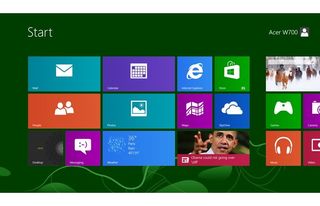
Click to EnlargeFor many, the Iconia W700 will mark their first encounter with Windows 8. Although Microsoft's new operating system is faster than its predecessor, business users may be bewildered by the many changes to the traditional Windows experience.
From the Start Screen, you can launch apps by clicking their respective tiles, or you can open a complete list of apps by tapping on the Start Screen itself. To close an open app, tap and drag it from the top of the screen to the bottom. The tiles themselves update depending on their context and usage. For instance, the Photos tile displays the latest picture you've taken with the W700's webcam, while the News tile shows the most recent headline and its accompanying photograph.
You can cycle through open apps by swiping your finger from the left side of the screen toward the center. Performing the same action, while keeping your finger on the app, allows you to open two apps simultaneously in split-screen mode.
Swiping your finger from the right side of the screen toward the center launches the Charms menu, from which you can return to the Start Screen, search for programs and files, share content, connect to devices and adjust settings. The settings sub-menu contains options to manage wireless settings, adjust volume, hide notifications, switch keyboard mode and turn off or restart the PC. However, you'll need to use the control panel in desktop mode to access more settings.
The Windows 8 desktop looks identical to its predecessor in Windows 7, with one glaring difference -- there's no Start Menu. Your best bet is to pin your favorite apps not just to the Start screen, but to the taskbar as well.
Apps
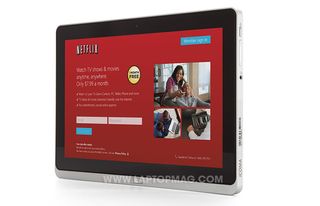
Click to EnlargeThe Iconia W700 comes pre-loaded with a number of third-party apps, including ChaCha, an alternative search engine; Skitch, a rudimentary photo editing tool; and 7digital Music Store, a portal for music downloads. Other bundled apps include eBay, Encyclopedia Britannica and Netflix, as well as Microsoft-branded applications such as Skype and SkyDrive. Acer's sole Modern app is Social Jogger, which aggregates all of your social media feeds, such as Facebook, YouTube and Twitter.
Acer also includes a number of its own desktop-based applications, such as Acer Power Management, which lets you see which applications are consuming the most battery power; Identity Card, which stores the tablet's information, such as its product name and serial number, in one convenient location; Live Updater; and Acer Instant Update Utility. Clear.fi Media and Clear.fi Photo, Acer's iTunes alternatives, also come preinstalled.
You can add more apps to the Start Screen by downloading them from the Windows Store. Just tap on the Tile that's labeled "Store." At the moment, the selection of apps for games, entertainment, music and video is very limited when compared with the hundreds of thousands of applications available for Android and iOS, but the selection is steadily improving.
Acer Ring
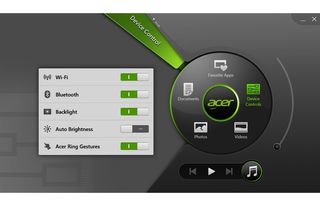
Click to EnlargeAcer's most helpful addition to the Windows 8 experience is a utility called Acer Ring. Simultaneously placing all five fingers on the screen in either UI causes a gray circle to appear. Inside the ring are icons for Favorite Apps, Documents, Photos, Videos and Device Controls. Tapping on one of these icons causes a new tab to appear at the top left of the screen, along with context-sensitive data. For instance, tapping on the Photo icon opens a thumbnail collage of your photos, which can be expanded to a thumbnail list of photos by swiping left on the collage with your finger. Swiping right with your finger collapses the list back into a collage.
Each of the icons has its own page that can be opened by tapping on the tab to the left of the ring. The Favorite Apps page, for example, lists thumbnails of your most-used applications that you can tap to open, while Photos shows all of your pictures and their accompanying albums. Tapping on the Edge Ring icon in the upper right corner opens two context-sensitive ring menus on the left and right side of the screen (the left is always the Acer Ring menu, from which you can switch to any of the other pages). On the Music page, for instance, tapping on the Edge Ring icon opens a ring menu with buttons for play, shuffle, repeat, forward and back.
Acer's utility is optimized to provide quick access to many users' most frequent files - documents, photos and music. Aside from a few quibbles (being unable to add Modern apps to the Favorite Apps page, for example), the Acer Ring utility proved incredibly intuitive to use and was a welcome relief from trying to navigate the Windows 8 desktop using our fingers. We wish other manufacturers of Windows 8 slates would follow Acer's lead.
Heat
Despite cramming so much powerful hardware into a relatively small frame, the Iconia W700 remained cool throughout our testing. After streaming a video on Hulu for 15 minutes, the tablet registered 83 degrees Fahrenheit on the display and 82 degrees on the back. We consider anything above 95 degrees uncomfortable. However, the W700's fan was noticeable in a quiet room.
Ports
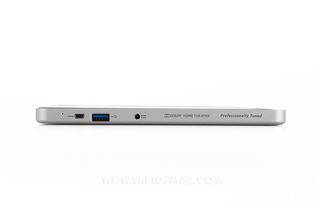
Click to EnlargeThe Iconia W700 offers a fair number of ports given the limited real estate. On the left, the tablet sports a micro-HDMI port, a full-size USB 3.0 port and a DC-in jack; a 3.5mm headphone jack, as well as the power button and volume rocker, can be found on the right. However, we would have liked to say a memory card slot.
Cameras
The Iconia W700's 5-megapixel rear-facing camera left much to be desired. Pictures we took of traffic on Fifth Avenue looked grainy and slightly washed out. Fine details, such as the telephone number painted on the side of a plumber's van across the street, appeared so blurry that we couldn't make them out. Captured 1080p video appeared equally indistinct, and we noticed a fair amount of stuttering during playback.

Click to EnlargeThe 1.3-megapixel front-facing camera fared slightly better. When we took a picture of our face, colors such as the blue on our collar popped off the screen, but details such as individual hairs in our beard became lost in a blur. As with the rear-facing camera, we noticed significant stuttering when watching 720p video shot with the front-facing camera.
Performance
Packing a 1.7-GHz Core i5-3317U CPU, 4GB of RAM and a 128GB Toshiba SSD, the Iconia W700 flew on our synthetic benchmarks and in everyday use. On PCMark 7, a benchmark that measures overall performance, the tablet achieved a score of 4,439. Although this falls behind the 4,948 turned in by the Aspire S7 (1.9-GHz Core i7-3517U CPU, 4GB of RAM, dual 128GB SSDs) and the 4,683 notched by the VAIO Duo 11 (1.7-GHz Core i5-3317U CPU, 6GB of RAM, 128GB SSD), it beats the ultraportable average by more than 1,100 points.
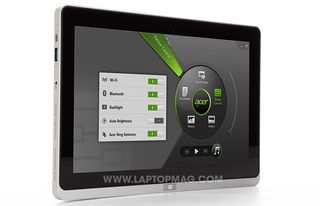
Click to EnlargeThe W700's 128GB Toshiba SSD proved equally fast. On the LAPTOP File Transfer test, the tablet copied 4.97GB of mixed media files in 37 seconds, a rate of 137.5 MBps. This crushes the ultraportable average of 77.2 MBps, although it falls just behind the VAIO Duo 11 (145.4 MBps). The Aspire S7, which packs dual 128GB SSDs in a RAID 0 configuration, notched a nearly untouchable transfer speed of 318.1 MBps.
Like the Aspire S7, the Iconia W700 launched Windows 8 in a mere 10 seconds. The VAIO Duo 11 proved nearly as fast with a boot time of just 13 seconds, while the average ultraportable boot time, which includes Windows 7-powered notebooks and laptops that use spinning hard drives, is a leisurely 35 seconds.
On the LAPTOP Spreadsheet Macro test, the W700 matched 20,000 names and addresses in 5 minutes and 49 seconds. This beats the ultraportable average by nearly a minute and a half, but is slower than the Aspire S7 (5:12) and the VAIO Duo 11 (3:00).
Unsurprisingly, the W700 handled everyday tasks with aplomb. When we flipped the tablet from landscape to portrait mode, for example, the accelerometer changed the orientation of the screen in just over a second (some devices such as the VAIO Duo 11 take two seconds or more), and swiping through open apps was fluid.
Graphics

Click to EnlargePowered by an integrated Intel HD Graphics 4000 GPU, the Iconia W700 delivered sluggish graphics performance. On 3DMark 11, the slate turned in a score of 412. This not only falls more than 350 points behind the ultraportable average, it's lower than the Aspire S7 (657) and the VAIO Duo 11 (615), both of which also use the same GPU.
The W700 offered similarly poor performance on 3DMark Vantage, a benchmark that measures gaming performance, with a score of 1,838. The Aspire S7, by contrast, notched a score of 3,050, while the average ultraportable turned in a score of 3,553.
Unsurprisingly, such poor numbers on the benchmark translate to low frame rates in games. When we ran "World of Warcraft" on Good settings with the resolution at the tablet's native 1920 x 1080, the W700 averaged an unplayable 16 frames per second, and bumping the graphics up to Ultra caused the performance to plummet to a mere 8 fps. Reducing the resolution to 1366 x 768 on Good settings boosted the average frame rate to 21 fps - better, but still not playable.
Battery Life
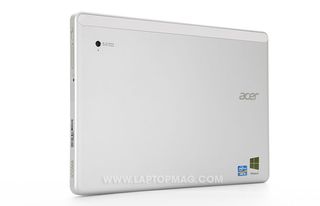
Click to EnlargeThanks to its huge 4,850-mAh battery, the Iconia W700 lasts nearly a full work day on a charge. When we ran the LAPTOP Battery Test (continuous surfing on the Web over Wi-Fi with brightness at 40 percent), the tablet ran for 6 hours and 48 minutes before expiring. This beats the ultraportable average by 28 minutes, and crushes both the Aspire S7 (4:10) and the VAIO Duo 11 (5:08).
Compared to tablets, the W700 falls behind the average (7:08), and way behind the 4th-generation iPad (12:22), but is on a par with the Microsoft Surface RT (7:43) and beats the ASUS Vivo Tab RT (6:33). Microsoft has said that the Surface Pro will last about half as long as the Surface RT.
Configurations and Warranty
In addition to the $999 model we reviewed, the Iconia W700 is also available in a $799 configuration (the Iconia W700-6607) that features a less powerful 1.8-GHz Core i3-3217U CPU, 4GB of RAM and a 64GB SSD.
For all configurations of the Iconia W700, Acer offers a one-year international traveler's limited warranty, including parts and labor. See how Acer fared in our annual Tech Support Showdown and Best and Worst Brands Report.
Verdict
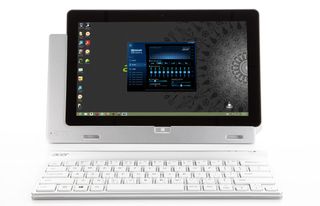
Click to EnlargeThe Iconia W700 offers excellent speed, a beautiful full HD display and good battery life (for a Core i5 device) in an attractive all-aluminum chassis. However, the 2-pound weight and high $999 price for this slate dampen our enthusiasm.
Compared to the upcoming Windows Surface Pro, the W700 looks like the better value in some respects. It looks as though the Acer lasts longer on a charge, and it delivers a bigger and higher-res screen in a thinner design. However, the Surface seems to be the more practical choice for travelers, as it will be offered with attachable keyboards. The W700's keyboard dock is meant to be used at your desk.
Despite its premium design and power, from a practical point of view the Iconia W700 doesn't feel as though it's worth twice as much as an iPad. As one of the first devices to deliver the full Windows 8 experience on a tablet PC, Acer is off to a good start. But if you're going to spend this much money on a Windows 8 device, you might be better off getting a convertible like the IdeaPad Yoga.
Acer Iconia W700-6465 Specs
| Brand | Acer |
| CPU | 1.7-GHz Intel Core i5-3317U |
| Camera Resolution | 5MP |
| Company Website | http://www.acer.com |
| Display Resolution | 1920 x 1080 |
| Display Size | 11.6 |
| Front-Facing Camera Resolution | 1280 x 1024 |
| Graphics Chip | Intel HD Graphics 4000 |
| Has Bluetooth | Yes |
| OS | Windows 8 |
| Ports | Headphone, USB 3.0, microHDMI |
| RAM Included | 4GB |
| RAM Upgradeable | 4GB |
| Size | 11.61 x 7.52 x 0.47 inches |
| Storage Drive Size | 128GB |
| Storage Drive Type | SSD |
| Warranty / Support | One-year international travelers limited warranty |
| Weight | 2.0 pounds |
| Wi-Fi | 802.11a/b/g/n |
